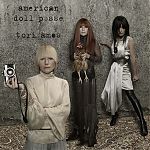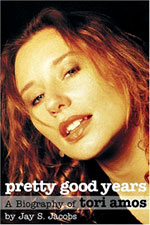- Articles
- Cherries
- Minutiae
- Q&A
- RAINN
- Releases
- Reviews
- Site News
- Them
- Toriphiles
- Touring
- TV/Radio/Web
- Video
News Archives
Keep an eye on our Twitter and Facebook pages since we often post quickie updates there when we're on-the-go.
During tours, we do our best to cover setlists in real-time on Twitter. If you want to tweet a show in, just DM or @ us on the day and tell us to watch your stream that night.
Tori is touring in 2017 to support the release of Native Invader. The European legs runs from early September through early October and the North American leg runs from late October to early December. We do not know if additional dates elsewhere will be added.

Native Invader (album, 2017)

Unrepentant Geraldines (album, 2014)

Gold Dust (album, 2012)

Night of Hunters (album, 2011)

Midwinter Graces (album, 2009)
 Abnormally Attracted To Sin (album, 2009)
Abnormally Attracted To Sin (album, 2009)
Live at Montreux 1991/1992 (DVD, 2008)

American Doll Posse (album, 2007)

A Piano (boxed set, 2006)

Pretty Good Years
(bio, 2006)

Fade To Red
(DVD, 2006)
 Comic Book Tattoo (book, 2008)
Comic Book Tattoo (book, 2008)News: Scotsman Interview (October 31, 2009)
Our ancestors have been celebrating midwinter for thousands of years, whether Norse or Native American. The Christians just happen to hold the copyright on it now. We should all be able to enjoy the rebirth of the sun. And that’s s-u-n.
Chitra Ramaswamy spoke to Tori about Midwinter Graces for The Scotsman and the interview was published in the October 31st edition of that newspaper. Besides the upcoming seasonal record, they also discussed Tori’s relationship with Cornwall, her Cherokee roots and family.
Interview: Tori Amos, singer
By Chitra Ramaswamy
With her emotional songs and her unique style Tori Amos has always done things her way. So when she returned to her small-town church-going roots for an album of seasonal cheer, she put her own spin on it
It’s been a decade since Tori Amos set up home in a 300-year-old farmhouse in Cornwall. This remote tip of England, a raggy finger pointing across the pond, has suited her perfectly. OK, the beaches of Bude may not be the first place you’d expect to find a multi-platinum selling American pop icon who once suckled a baby pig on an album cover. Then again, it isn’t exactly hard to picture the once dubbed Queen of the Fairies whirling along the Cornish coastal paths like a heroine from a Daphne du
People tend to describe Amos as either a bit batty or as mad as a box of frogs. It’s that pig-nursing business, the way she communes with her Bösendorfer piano, squirming on her stool as though her pants are on fire. It’s how she refers to herself in the third person, her many personas, the fact that she calls the English sound engineer, Mark Hawley, whom she married in 1998 “Husband”… And so the list goes on.
Amos looks the part too with those colour-changing eyes and iconic carrot-top, managing to appear at once the 46-year-old glamourpuss and the spirit-child. However, for the record she actually talks more sense than most pop stars, almost disappointingly so. She can be a notoriously tricksy interviewee if she’s not in the mood – thankfully she is today – and it can be hard to keep her on track. Last time I interviewed her it was her multiple alter-egos; this time she keeps pedalling off in the direction of her Native American ancestry. Sometimes she pauses for so long between answers I start worrying I’ve lost her to the woods.
As a backdrop, Cornwall provides the perfect setting for Amos’s salty eccentricity. She married an Englishman, brought her chef and state-of-the-art studio with her, and their daughter, Natashya, was born on British soil (possibly headfirst into it, knowing Amos). Despite the public school accent and having already gone around the world five times on tour by the tender ago of nine, Natashya apparently has a trace of a Cornish twang. So it comes as something of a surprise to hear that Amos still doesn’t really feel she belongs in Britain. “Cornwall is so beautiful,” she concedes. “It’s magical and wonderful. But this is my husband’s power place. I’m a guest here. I hope I’m a good guest and you know, some people like guests more than family members. The Brits are lovely to me, really lovely, but it’s not my culture and I’m not trying to pretend it is.”
It appears to be Husband who keeps her here. “I’m an American who fell in love with a very difficult British person whom I adore and am absolutely in love with,” she laughs. “And I have a daughter who is very British. Tash’s soul is in Cornwall.” And what about her soul? “My soul is tied up in my mother’s people,” says Amos, and we’re back on Cherokee ground. “I’m tied to the land. The Native American community have opened their door to me, and it’s stayed open. That’s where I get my juice.” Does she go back and meet up with Native Americans she’s encountered over the years? “No, I go to the land,” she says, rather mysteriously. “I see people but what I’m saying is the reason I go back to America is because it’s the place of my mother’s people. I’m able to tap into the energy and I get a lot of strength from it.”
I’m still not sure what she’s getting at but ancestry and land-snuggling aside, Amos is spending more and more time in America. Since her brother died in 2005 in a car accident, she has wanted to be closer to her sister, a single parent and doctor with five children, and their parents. These days she splits her time between Cornwall and Florida, which sounds pretty crazy when you factor in a neverending global touring schedule and a nine-year-old child. But her part-Cherokee mother and her father, a Methodist minister in whose Baltimore church Amos first started playing piano at the age of four, are in their eighties now and mortality is evidently on her mind. “My sister and I have always been close but because of that (the death of her brother] she calls me every day,” she says. “Maybe something like that makes you realise that time is passing and we’re all eventually going to leave the planet. We began to really value our relationship and we also realised that our parents are incredibly vulnerable and what it put them through. Parents should never bury their children.”
I sense the tug between Britain and America must be a source of debate back at the farmhouse. I also sense, from Amos’s history of taking on record companies, that she doesn’t back down in a fight. Will they be returning to the States for good? “I think Mark likes to travel,” she says with a mischievous laugh that makes me wonder whether he does at all. “As Tash gets older she’ll be more open to coming to visit us wherever we are. Mark is getting to be more of a global-thinking guy.” So she’s working on him. “Yeah,” she says breezily. “The way I see it, we’re citizens of the earth so let’s see it while we can. Life is short and there are so many places to experience.” Amos has been around the world a dozen times at least and has got to the point where she thinks nothing of “popping down to Sydney”.
Eventually talk turns to her new album of gorgeous seasonal songs, Midwinter Graces. It’s Amos’s 11th record, combining carols old (Star of Wonder) and new (Pink and Glitter, Our New Year), all with a classic Tori Amos spin, whether that means middle-eastern rhythms, hushed piano balladry, or feminist retellings. She doesn’t see them as religious songs but is delighted that this is her parents’ favourite of her albums so far. “My dad said ‘what you did is no different to what Charles Wesley did’,” she explains, referring to one of the founders of Methodism. “Wesley would take popular songs from the bar room or sea shanties and put Christology to them. So I took some and added more of a feminine, nurturing ideology. Our ancestors have been celebrating midwinter for thousands of years, whether Norse or Native American. The Christians just happen to hold the copyright on it now. We should all be able to enjoy the rebirth of the sun. And that’s s-u-n.” She spells it out, just in case.
It’s been a busy year. Midwinter Graces is Amos’s second album of 2009 following Abnormally Attracted to Sin, which came out in the summer. Last year Amos signed to Universal after negotiating an end to her five-year contract with Epic. Universal’s chairman, Doug Morris, is the man who broke her debut, Little Earthquakes, but they hadn’t spoken for 14 years. When Morris discovered Amos had left Epic, he flew out to see her immediately and asked her a single question: “What do you want?” She trusts him more than most industry bigwigs, and signed the contract.
But Amos has always done things her own way and that’s not about to change. She still produces, sings, plays, and records all her own music in her farmhouse studio. And her outlandish choices pay off. She has sold more than 12 million albums and they’re hardly packed with dancefloor fillers, Professional Widow aside. One record was arranged into six gardens; for Scarlet’s Walk she travelled across America as an alter-ego; and even her greatest hits were classified according to the Dewey decimal system. And on tour Amos still performs a different set each night depending on her mood. “You shouldn’t go out there unless you own your stage,” she says, switching to diva mode. “That’s just what I do.”
She is renowned in the industry for being a shrewd and uncompromising businesswoman, the kind who early on threatened to burn her master tapes if her record company brought in their own producer. “I think I’ve survived a lot of changes that have happened,” she says. “When you get to this point you realise that you’re a survivor. There are going to be people you respect and there are going to be people…” she pauses. “Well, people who are definitely not supportive of women, who really don’t want women to be equal, and it becomes difficult to walk out the door. The music industry is a boys’ club.” There may be things Amos said at 30 that she might say differently now. “But I’d still fight the fight,” she insists. “I’d just choose my weapons differently.”
Amos seems to get tired of fighting though. There is a telling moment when I ask her whether her daughter is showing an interest in music. “I don’t know if I want that for her,” she confesses. “She has this beautiful voice and she sings in the shower and writes her own melodies. Where it’s all going to lead, it’s hard to know. She wants to act and sing and as a parent you try and support all of it. But there is a side of me that wishes she wanted to be a doctor. It’s because I know the business so well…”
Still, Amos continues to make music with a zest that belies her views on the business. Listening to it, I wondered if the album was a love letter to her father, the profoundly religious preacherman who slowly came round to supporting his unconventional, prodigious daughter. These days he’s learning to play the piano too. “He began to develop this poetry and then he wanted to play an instrument,” she says proudly. “This creative spell has blossomed in the last little while and I’ve never seen him so happy in his life.” When Amos sings the carols now, in her forties, she can see herself back in her father’s church as a child, playing for his congregation and starting to realise who she might be. “Yes, I do know this music,” she says. “But playing the songs, I would think, ‘this is such a pretty melody, why is there so much guilt in it?’”
Amos’s first memory may be playing the piano in her father’s church, but her mother has a photo of her playing the tiny organ at her grandfather’s house at the age of two-and-a-half. By the time she was 13, her father was taking her out to piano bars in Washington DC, trying to get his daughter a spot on the bill. “He was a minister and he took me to a gay bar and sat there with his dog collar on,” she says with a chuckle. When everyone else slammed the door in their faces, it was the gay bars that invited in this unconventional double act; the preacher and his flame-haired teenage daughter. “It looked very odd,” she admits. “At the gay bar the manager looked at him, looked at me, then said ‘OK, there’s a piano over there. If this isn’t working out in ten minutes you’re going to go, and go quickly.’” She laughs again. What happened after the ten minutes? “I stayed all night and played for tips while my dad drank ginger ale.”
Amos won a scholarship to the Peabody Conservatory of Music when she was five, but by 11 she’d lost it. She was more into Led Zeppelin. She moved to LA and got led astray for a while as she demurely puts it. When she abandoned the crashing guitars of her pop-metal band Y Kant Tori Read, and returned to the piano, she found her way again. “I ended up following the commercial route because I thought ‘oh my god, I have to stop playing bars’. I couldn’t keep doing it after 13 years.” Now she plays a bigger bar “where people don’t spill lager all over the keys”.
She hasn’t followed the commercial route since. When Amos is at her best, she’s at her most confessional, her most thoughtful, sometimes her most angry. Her breakthrough hit, Cornflake Girl, was about female genital mutilation. She penned a song about her experience of being raped at knifepoint when she was 21 by a fan to whom she had offered a lift home. She has sung about her miscarriages, her views on America, religion and her feminism. Power, she tells me, has been the biggest theme of all. “Where have you left it?” she demands of both of us. “Who did you give it to today? When are you going to hold it yourself? How are you going to do it? That’s the key to the songs. I do that now in my life but I’ve done a lot of work to get where I am.”
Amos has done most of that work through music. “It’s helped me find compassion for life and living and for myself,” she says. “It’s stopped me from becoming a bitter person. Having music has helped me to love deeper the people in my life and show them I value them. There is a lot of empowerment on the records. You can choose to be destroyed or you can choose to create. And so things have happened to me?” She shrugs. “Things have happened to most people I know.” I ask her what life might have been like had she never sat at that piano in church. “I wonder,” she muses. “I wouldn’t be who I am, that’s for sure. It was my way of escaping. I could always sit at the piano and be right across the galaxy.”
Midwinter Graces by Tori Amos is out on 9 November from Island Records, £14.69.
This article was first published in The Scotsman on October 31, 2009


